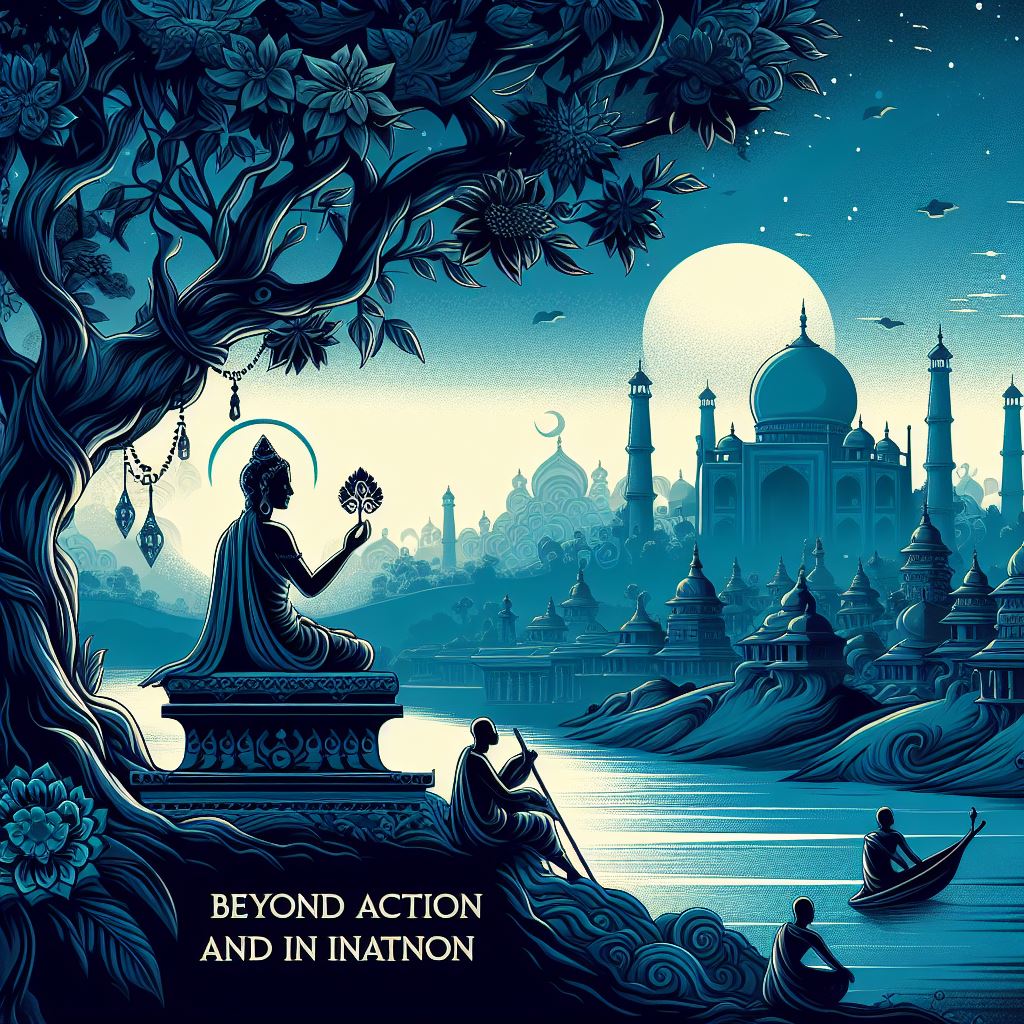The eighth chapter of the Bhagavad Gita is Akshara Brahma Yoga. In this chapter, Krishna reveals the importance of the last thought before death. If we can remember Krishna at the time of death, we will certainly attain him. Thus, it is very important to be in constant awareness of the Lord at all times, thinking of Him and chanting His names at all times. By perfectly absorbing their mind in Him through constant devotion, one can go beyond this material existence to Lord’s Supreme abode.
slok:’8.1′,
‘arjuna uvāca . kiṃ tad brahma kimadhyātmaṃ kiṃ karma puruṣottama . adhibhūtaṃ ca kiṃ proktamadhidaivaṃ kimucyate ||8-1||’,
‘Swami Sivananda did not comment on this sloka’,
slok:’8.2′,
‘adhiyajñaḥ kathaṃ ko.atra dehe.asminmadhusūdana . prayāṇakāle ca kathaṃ jñeyo.asi niyatātmabhiḥ ||8-2||’,
‘8.2 Who and how is Adhiyajna here in this body, O destroyer of Madhu (Krishna)? And how at the time of death, art Thou to be known by the self-controlled?’,
slok:’8.3′,
‘śrībhagavānuvāca . akṣaraṃ brahma paramaṃ svabhāvo.adhyātmamucyate . bhūtabhāvodbhavakaro visargaḥ karmasaṃjñitaḥ ||8-3||’,
‘8.3 The Blessed Lord said Brahman is the Imperishable, the Supreme; Its essential nature is called Self-knowledge; the offering (to the gods) which causes existence and manifestation of beings and which also sustains them is called action.’,
slok:’8.4′,
‘adhibhūtaṃ kṣaro bhāvaḥ puruṣaścādhidaivatam . adhiyajño.ahamevātra dehe dehabhṛtāṃ vara ||8-4||’,
‘8.4 Adhibhuta (knowledge of the elements) pertains to My perishable Nature and the Purusha or the Soul is the Adhidaiva; I alone am the Adhiyajna here in this body, O best among the embodied (men).’,
slok:’8.5′,
‘antakāle ca māmeva smaranmuktvā kalevaram . yaḥ prayāti sa madbhāvaṃ yāti nāstyatra saṃśayaḥ ||8-5||’,
‘8.5 And whosoever, leaving the body, goes forth remembering Me alone, at the time of death, he attains My Being: there is no doubt about this.’,
slok:’8.6′,
‘yaṃ yaṃ vāpi smaranbhāvaṃ tyajatyante kalevaram . taṃ tamevaiti kaunteya sadā tadbhāvabhāvitaḥ ||8-6||’,
‘8.6 Whosoever at the end leaves the body, thinking of any being, to that being only does he go, O son of Kunti (Arjuna), because of his constant thought of that being.’,
slok:’8.7′,
‘tasmātsarveṣu kāleṣu māmanusmara yudhya ca . mayyarpitamanobuddhirmāmevaiṣyasyasaṃśayaḥ ||8-7||’,
‘8.7 Therefore at all times remember Me only and fight. With mind and intellect fixed (or absorbed) in Me, thou shalt doubtessly come to Me alone.’,
slok:’8.8′,
‘orsaṃśayama abhyāsayogayuktena cetasā nānyagāminā . paramaṃ puruṣaṃ divyaṃ yāti pārthānucintayan ||8-8||’,
‘8.8 With the mind not moving towards any other thing, made steadfast by the method of habitual meditation, and constantly meditating, one goes to the Supreme Person, the Resplendent, O Arjuna.’,
slok:’8.9′,
‘kaviṃ purāṇamanuśāsitāraṃ aṇoraṇīyaṃsamanusmaredyaḥ . sarvasya dhātāramacintyarūpaṃ ādityavarṇaṃ tamasaḥ parastāt ||8-9||’,
‘8.9 Whosoever meditates on the Omniscient, the Ancient, the Ruler (of the whole world), minuter than an atom, the supporter of all, of inconceivable form, effulgent like the sun and beyond the darkness of ignorance.’,
slok:’8.10′,
‘prayāṇakāle manasā.acalena bhaktyā yukto yogabalena caiva . bhruvormadhye prāṇamāveśya samyak sa taṃ paraṃ puruṣamupaiti divyam ||8-10||’,
‘8.10 At the time of death, with unshaken mind, endowed with devotio, by the power of Yoga, fixing the whole life-breath in the middle of the two eyrows, he reaches that resplendent Supreme Person.’,
slok:’8.11′,
‘yadakṣaraṃ vedavido vadanti viśanti yadyatayo vītarāgāḥ . yadicchanto brahmacaryaṃ caranti tatte padaṃ saṃgraheṇa pravakṣye ||8-11||’,
‘8.11 That which is declared Imperishable by those who know the Vedas, that which the self-controlled (ascetics or Sannyasins) and passion-free enter, that desiring which celibacy is practised that goal I will declare to thee in brief.’,
slok:’8.12′,
‘sarvadvārāṇi saṃyamya mano hṛdi nirudhya ca . mūdhnyā^^rdhāyātmanaḥ prāṇamāsthito yogadhāraṇām ||8-12||’,
‘8.12 Having closed all the gates, confined the mind in the heart and fixed the life-breath in the head, engaged in the practice of concentration.’,
slok:’8.13′,
‘omityekākṣaraṃ brahma vyāharanmāmanusmaran . yaḥ prayāti tyajandehaṃ sa yāti paramāṃ gatim ||8-13||’,
‘8.13 Uttering the one-syllabled Om the Brahman and remembering Me, he who departs, leaving the body, attains to the Supreme Goal.’,
slok:’8.14′,
‘ananyacetāḥ satataṃ yo māṃ smarati nityaśaḥ . tasyāhaṃ sulabhaḥ pārtha nityayuktasya yoginaḥ ||8-14||’,
‘8.14 I am easily attainable by that ever-steadfast Yogi who constantly and daily remembers Me (for a long time), not thinking of anything else (with a single mind or one-pointed mind), O Partha (Arjuna).’,
slok:’8.15′,
‘māmupetya punarjanma duḥkhālayamaśāśvatam . nāpnuvanti mahātmānaḥ saṃsiddhiṃ paramāṃ gatāḥ ||8-15||’,
‘8.15 Having attained Me these great souls do not again take birth (here) which is the place of pain and is non-eternal: they have reached the highest perfection (liberation).’,
slok:’8.16′,
‘ābrahmabhuvanāllokāḥ punarāvartino.arjuna . māmupetya tu kaunteya punarjanma na vidyate ||8-16||’,
‘8.16 (All) the worlds including the world of Brahma are subject to return again, O Arjuna; but he who reaches Me, O son of Kunti, has no rirth.’,
slok:’8.17′,
‘sahasrayugaparyantamaharyad brahmaṇo viduḥ . rātriṃ yugasahasrāntāṃ te.ahorātravido janāḥ ||8-17||’,
‘8.17 Those people who know the day of Brahma which is of a duration of a thousand Yugas (ages) and the night which is also of a thousand Yugas duration, they know day and night.’,
slok:’8.18′,
‘avyaktād vyaktayaḥ sarvāḥ prabhavantyaharāgame . rātryāgame pralīyante tatraivāvyaktasaṃjñake ||8-18||’,
‘8.18 From the Unmanifested all the manifested (worlds) proceed at the coming of the ‘day’; at the coming of the ‘night’ they dissolve verily into ï1thatï1 alone which is called the Unmanifested.’,
slok:’8.19′,
‘bhūtagrāmaḥ sa evāyaṃ bhūtvā bhūtvā pralīyate . rātryāgame.avaśaḥ pārtha prabhavatyaharāgame ||8-19||’,
‘8.19 This same multitude of beings, being born again and again, is dissolved, helplessly, O Arjuna (into the Unmanifested) at the coming of the night and comes forth at the coming of the day.’,
slok:’8.20′,
‘parastasmāttu bhāvo.anyo.avyakto.avyaktātsanātanaḥ . yaḥ sa sarveṣu bhūteṣu naśyatsu na vinaśyati ||8-20||’,
‘8.20 But verily there exists, higher than this Unmanifested, another unmanifested Eternal, which is not destroyed when all beings are destroyed.’,
slok:’8.21′,
‘avyakto.akṣara ityuktastamāhuḥ paramāṃ gatim . yaṃ prāpya na nivartante taddhāma paramaṃ mama ||8-21||’,
‘8.21 What is called the Unmanifested and the Imperishable, That they say is the highest goal. They who reach It do not return (to this Samsara). That is My highest abode (place or state).’,
slok:’8.22′,
‘puruṣaḥ sa paraḥ pārtha bhaktyā labhyastvananyayā . yasyāntaḥsthāni bhūtāni yena sarvamidaṃ tatam ||8-22||’,
‘8.22 That highest Purusha, O Arjuna, is attainable by unswerving devotion to Him alone within Whom all beings dwell and by Whom all this is pervaded.’,
slok:’8.23′,
‘yatra kāle tvanāvṛttimāvṛttiṃ caiva yoginaḥ . prayātā yānti taṃ kālaṃ vakṣyāmi bharatarṣabha ||8-23||’,
‘8.23 Now I will tell thee, O chief of Bharatas, the times departing at which the Yogis will return or not return.’,
slok:’8.24′,
‘agnirjotirahaḥ śuklaḥ ṣaṇmāsā uttarāyaṇam . tatra prayātā gacchanti brahma brahmavido janāḥ ||8-24||’,
‘8.24 Fire, light daytime, the bright fortnight, the six months of the northern path of the sun (the northern solstice) departing then (by these) men who know Brahman go to Brahman.’,
slok:’8.25′,
‘dhūmo rātristathā kṛṣṇaḥ ṣaṇmāsā dakṣiṇāyanam . tatra cāndramasaṃ jyotiryogī prāpya nivartate ||8-25||’,
‘8.25 Attaining to the lunar light by smoke, night time, the dark fortnight also, the six months of the southern path of the sun (the southern solstice), the Yogi returns.’,
slok:’8.26′,
‘śuklakṛṣṇe gatī hyete jagataḥ śāśvate mate . ekayā yātyanāvṛttimanyayāvartate punaḥ ||8-26||’,
‘8.26 The bright and the dark paths of the world are verily thought to be eternal; by the one (the bright path) a man goes not to return and by the other (the dark path) he returns.’,
slok:’8.27′,
‘naite sṛtī pārtha jānanyogī muhyati kaścana . tasmātsarveṣu kāleṣu yogayukto bhavārjuna ||8-27||’,
‘8.27 Knowing these paths, O Arjuna, no Yogi is deluded; therefore at all times be steadfast in Yoga.’,
slok:’8.28′,
‘vedeṣu yajñeṣu tapaḥsu caiva dāneṣu yatpuṇyaphalaṃ pradiṣṭam . atyeti tatsarvamidaṃ viditvā yogī paraṃ sthānamupaiti cādyam ||8-28||’,
‘8.28 Whatever fruit of merit is declared (in the scriptures) to accrue from (the study of) the Vedas, (the performance of) sacrifices, (the practice of) austerities, and gifts beyond all this goes the Yogi, having known this; and he attains to the Supreme Primeval (first or ancient) Abode.’,
slok:’8.29′,
‘OM tatsaditi śrīmadbhagavadgītāsūpaniṣatsu brahmavidyāyāṃ yogaśāstre śrīkṛṣṇārjunasaṃvāde akṣarabrahmayogo nāmāṣṭamo.adhyāyaḥ ||8-29||’,
‘Swami Sivananda did not comment on this sloka’,

